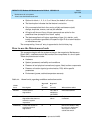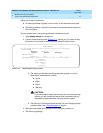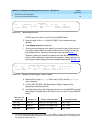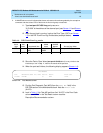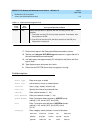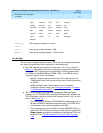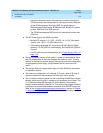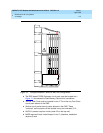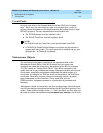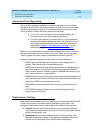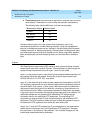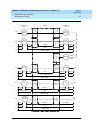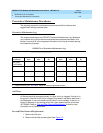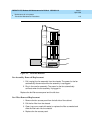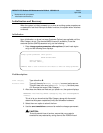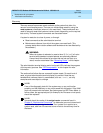
DEFINITY ECS Release 8.2 Maintenance for R8.2csi
555-233-119 Issue 1
April 2000
Maintenance for csi systems
1-14Circuit Packs
1
Circuit Packs
All circuit pack slots in the Compact Modular Cabinet (CMC) are “universal
slots.” That is, any slot can contain any type of circuit pack (port, control, or
service), hence the absence of the purple and white slot coding found on other
DEFINITY products. The only requirements for slot allocation are:
■ The TN798 Processor must be installed in slot 1
■ The TN2182 Tone-Clock must be installed in slot 2
NOTE:
The TN2182 is the only Tone-Clock circuit pack allowed in the CMC.
■ A TN744D Call Classifier/Tone Detector circuit pack may be required in
systems with heavy traffic. This circuit pack can be installed into any port,
although slot 1 of Cabinet B is preferred.
Maintenance Objects
The maintenance subsystem is partitioned into separate entities called
Maintenance Objects (MOs). Each MO is referred to by an upper-case,
mnemonic-like name that serves as an abbreviation for the MO. For example,
“CO-TRK” stands for “Central Office TRunK.” Each MO is monitored by the
system and has its own maintenance strategy. Although most MOs are individual
circuit packs, some MOs are hardware components that reside on part of a
circuit pack, for example, the TDM bus clock circuits reside on the Tone/Clock
circuit pack. Other MOs, such as cabinet environmental sensors, represent
larger subsystems or sets of monitors. Finally, some MOs, such as
SYNChronization, represent processes or a combination of processes and
hardware.
“Maintenance names” are recorded in the Error and Alarm logs. Individual copies
of an MO are assigned an address that defines the MO’s physical location in the
system. These locations display as the
Port
field in the Alarm and Error logs and
as output of various commands such as
test board
,
busy tdm-bus
, and so forth.



